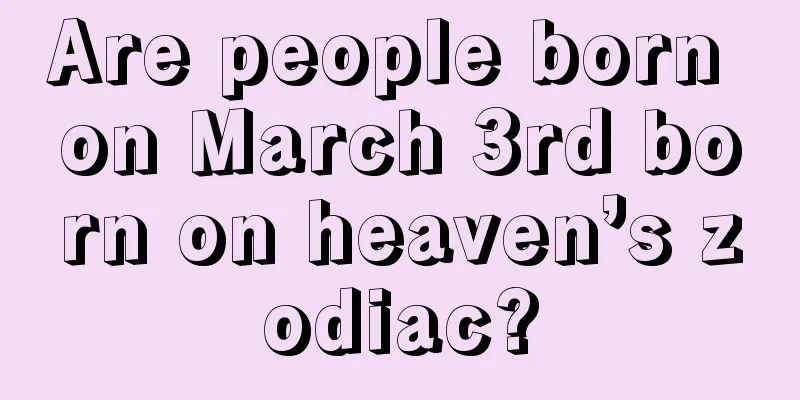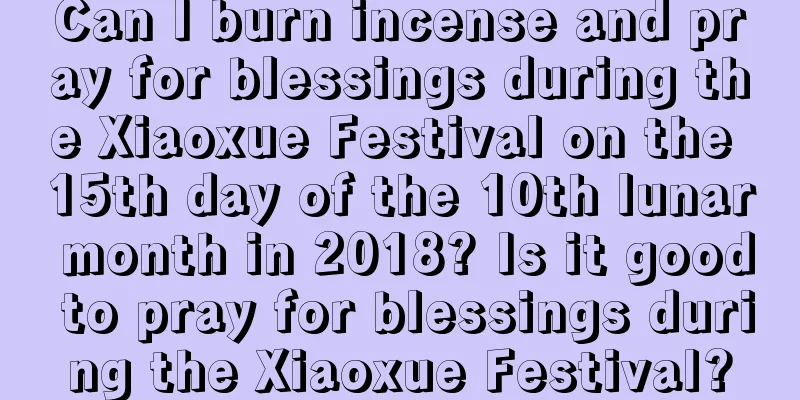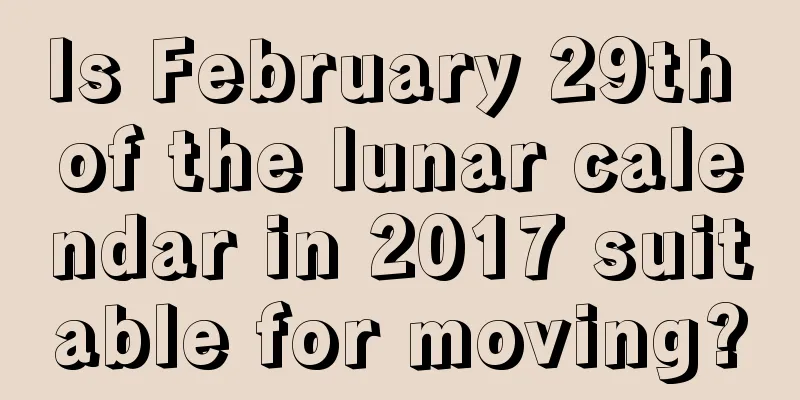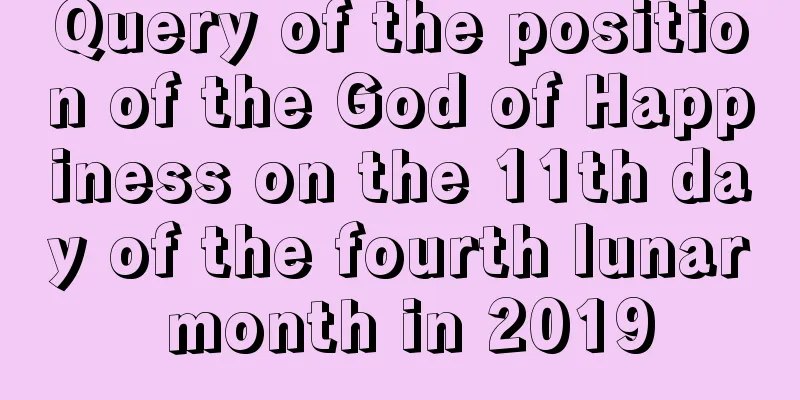When did the New Year’s Day holiday originate? Was it on the first day of the first lunar month in ancient times?
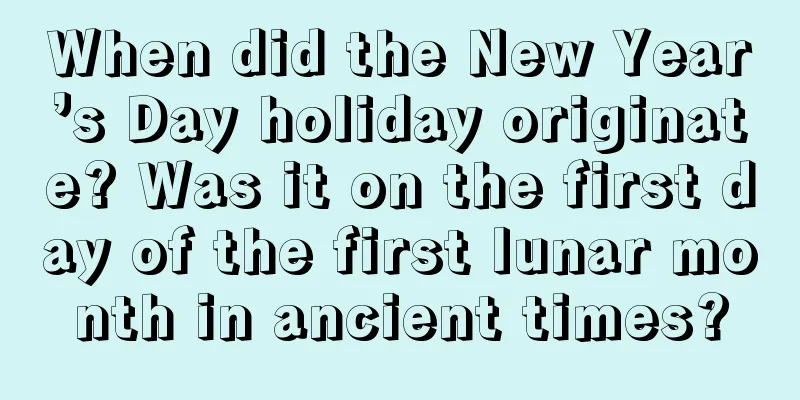
We all know that the current New Year's Day is on January 1st of the Gregorian calendar every year. When did the New Year's Day festival originate? Was the New Year's Day on the first day of the first lunar month in ancient times? Shuimoxiansheng.com has carefully compiled detailed information about the twelfth lunar month of 2019. If you want to know the auspicious and inauspicious days in the twelfth lunar month, just go to Shuimoxiansheng.com.Was New Year’s Day on the first day of the first lunar month in ancient times?——New Year’s Day in Chinese history refers to the first day of the first lunar month, which is now the Spring Festival.Specific content introduction: 《1》"New Year's Day" in Chinese history refers to the "first day of the first lunar month". The calculation method of the "first lunar month" was very inconsistent before the period of Emperor Wu of Han, and the dates of New Year's Day in different dynasties were not consistent. 《2》 Starting from Emperor Wu of the Han Dynasty, the first month of the lunar calendar was designated as the "first month" and the first day of the month was called New Year's Day, which was used until the end of the Qing Dynasty. 《3》After the Revolution of 1911, in order to "follow the Xia calendar to follow the agricultural season and the Western calendar to facilitate statistics", the Gregorian calendar was decided to be used in the first year of the Republic of China (actually used in 1912), and January 1 of the Gregorian calendar was designated as "New Year", but it was not called "New Year's Day". 《4》In 1949, the People's Republic of China adopted January 1 of the Gregorian calendar as New Year's Day, so "New Year's Day" is also known as the "Gregorian Year", "New Calendar Year" or "Gregorian Year" in China. With the continuous development of history, the time of New Year's Day has also changed. On September 27, 1949, New Year's Day was officially established as January 1st of the Gregorian calendar. When did the New Year's Day holiday originate?——China's New Year's Day originated from Zhuanxu, one of the Three Sovereigns and Five Emperors, and has a history of more than 3,000 years.》The word "New Year's Day" first appeared in the poem "Book of Jin": "Emperor Zhuanxu took the first month of summer as the beginning, which was actually the spring of the New Year's Day." 》During the Northern and Southern Dynasties, there was a record in the poem "Jie Ya" by Xiao Ziyun of the Southern Dynasty that "four new New Year's Day, longevity in the early spring morning". China first called the first day of the first lunar month "New Year's Day". Yuan means "beginning" or "beginning", and Dan means "day". New Year's Day means "the first day", which is the first day of the year. 》Before Emperor Wu of Han, there was no unified definition of the date for the first day of the first lunar month. Therefore, the month and day of New Year's Day are not consistent throughout the ages. 》In the first year of the Republic of China, it was decided to use the Gregorian calendar, and January 1 of the Gregorian calendar was designated as "New Year", but it was not called "New Year's Day". 》After the founding of New China, January 1 of the Gregorian calendar was officially designated as "New Year's Day", and the first day of the first lunar month was changed to "Spring Festival". ——New Year's Day in other countries: 》Belgium: In Belgium, the first thing people do in rural areas on New Year’s morning is to greet the livestock. ——People walked up to the cows, horses, sheep, dogs, cats and other animals, and solemnly told them: "Happy New Year!" 》Germany: During the New Year's Day, every German household will place a fir tree and a horizontal tree. ——Silk flowers are tied between the leaves, which represents the blooming flowers and the spring that fills the world. They climb onto chairs just before the New Year arrives at midnight on New Year's Eve, and when the bell rings, they jump off the chairs and throw a heavy object behind the chairs to show that they are throwing away the disaster and jumping into the New Year. In rural Germany, there is a New Year custom of "tree climbing competition" to show success. 》France: People celebrate the New Year with wine. People start drinking and partying from New Year's Eve until January 3rd. ——The French believe that the weather on New Year’s Day foreshadows the prospects of the new year. Early in the morning on New Year's Day they would go to the streets to look at the wind direction for divination: if the wind blew from the south, it would indicate good weather and a peaceful and hot year; if the wind blew from the west, it would mean a bumper year for fishing and milking; if the wind blew from the east, there would be a high yield of fruit; and if the wind blew from the north, it would mean a poor harvest. |
Recommend
Is it okay to get engaged on the 15th day of the first lunar month in 2022? Is it a good idea to get engaged on the Lantern Festival?
Engagement is one of the major events in life. The...
What are the do’s and don’ts for Army Day on July 4, 2022? Is this day suitable for breaking ground?
In the seventh month of the lunar calendar, fruits...
When is the Xiaoxue solar term in 2018?
Introduction: In our country's tradition, sola...
What is the lunar calendar date of November 26, 2019?
What is the date of November 26th in the lunar ca...
Is August 14th of the lunar calendar 2017 a good day? Is it appropriate to start construction on renovation?
Introduction: In our country, there is a custom th...
Is it suitable to pray on April 28th of the lunar calendar in the Year of the Rat 2020?
Is it suitable to pray on April 28th of the lunar ...
Check the lunar calendar for February 26th, 2018. Is it a good day?
If you want to know more about the second month o...
Is it good to be born on National Day in the Year of the Snake? Is it a destiny of wealth?
The fate of people born on National Day under the ...
Is the Rain Water solar term in 2020 an auspicious day for burial? Check the auspicious time for Rain Water on February 19!
Introduction: It is also necessary to choose an au...
Is it okay to pray for a child on November 22, 2019 in the lunar calendar? When will I give birth today?
Is it okay to pray for a child on November 22, 201...
What zodiac sign do people born on the second day of the eleventh lunar month in 2020 belong to?
What zodiac sign do people born on the second day ...
What is the content of the lunar calendar for the second day of the eighth month in 2017? Is the day suitable for decoration?
Introduction: The quality of home life is improvin...
Analysis of the horoscope of a girl born on the 17th day of the twelfth lunar month in 2019!
The eight characters of a person's birth date ...
Is April 27th of the lunar calendar in 2022 suitable for ancestor worship? What offerings should be brought to ancestor tomb sweeping?
The fourth month of the lunar calendar arrives in ...
What is the date of November 15th in the lunar calendar in 2020? Is the funeral a good idea?
The quality of days is different every day, and di...

